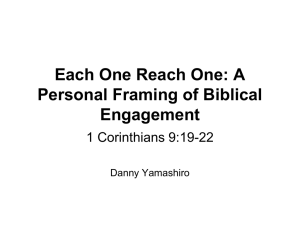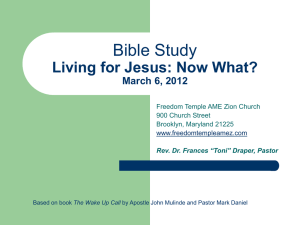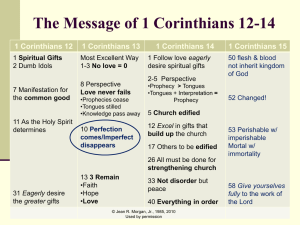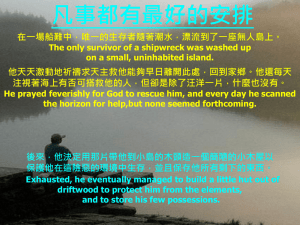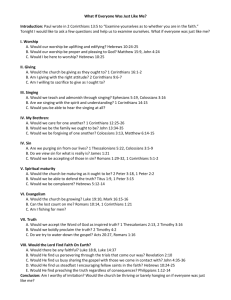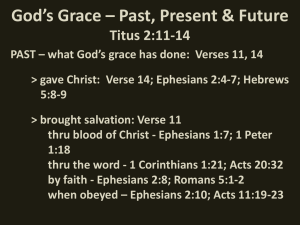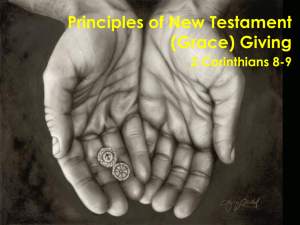Stewardship #1 1 2 Corinthians 8:1
advertisement
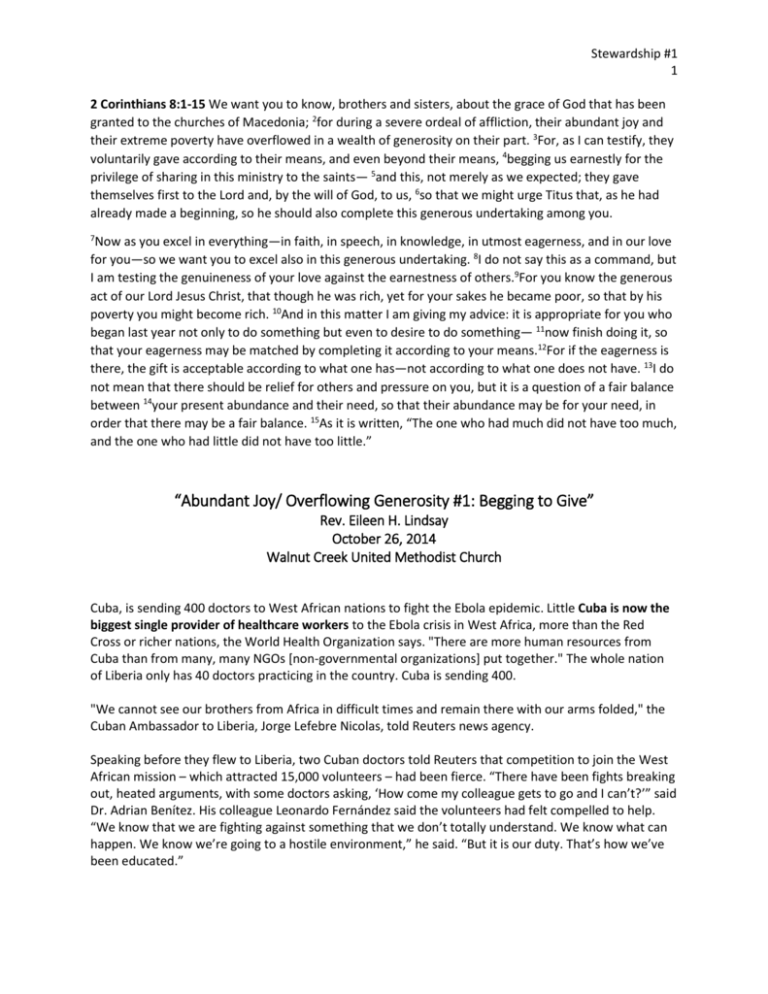
Stewardship #1 1 2 Corinthians 8:1-15 We want you to know, brothers and sisters, about the grace of God that has been granted to the churches of Macedonia; 2for during a severe ordeal of affliction, their abundant joy and their extreme poverty have overflowed in a wealth of generosity on their part. 3For, as I can testify, they voluntarily gave according to their means, and even beyond their means, 4begging us earnestly for the privilege of sharing in this ministry to the saints— 5and this, not merely as we expected; they gave themselves first to the Lord and, by the will of God, to us, 6so that we might urge Titus that, as he had already made a beginning, so he should also complete this generous undertaking among you. 7 Now as you excel in everything—in faith, in speech, in knowledge, in utmost eagerness, and in our love for you—so we want you to excel also in this generous undertaking. 8I do not say this as a command, but I am testing the genuineness of your love against the earnestness of others.9For you know the generous act of our Lord Jesus Christ, that though he was rich, yet for your sakes he became poor, so that by his poverty you might become rich. 10And in this matter I am giving my advice: it is appropriate for you who began last year not only to do something but even to desire to do something— 11now finish doing it, so that your eagerness may be matched by completing it according to your means.12For if the eagerness is there, the gift is acceptable according to what one has—not according to what one does not have. 13I do not mean that there should be relief for others and pressure on you, but it is a question of a fair balance between 14your present abundance and their need, so that their abundance may be for your need, in order that there may be a fair balance. 15As it is written, “The one who had much did not have too much, and the one who had little did not have too little.” “Abundant Joy/ Overflowing Generosity #1: Begging to Give” Rev. Eileen H. Lindsay October 26, 2014 Walnut Creek United Methodist Church Cuba, is sending 400 doctors to West African nations to fight the Ebola epidemic. Little Cuba is now the biggest single provider of healthcare workers to the Ebola crisis in West Africa, more than the Red Cross or richer nations, the World Health Organization says. "There are more human resources from Cuba than from many, many NGOs [non-governmental organizations] put together." The whole nation of Liberia only has 40 doctors practicing in the country. Cuba is sending 400. "We cannot see our brothers from Africa in difficult times and remain there with our arms folded," the Cuban Ambassador to Liberia, Jorge Lefebre Nicolas, told Reuters news agency. Speaking before they flew to Liberia, two Cuban doctors told Reuters that competition to join the West African mission – which attracted 15,000 volunteers – had been fierce. “There have been fights breaking out, heated arguments, with some doctors asking, ‘How come my colleague gets to go and I can’t?’” said Dr. Adrian Benítez. His colleague Leonardo Fernández said the volunteers had felt compelled to help. “We know that we are fighting against something that we don’t totally understand. We know what can happen. We know we’re going to a hostile environment,” he said. “But it is our duty. That’s how we’ve been educated.” Stewardship #1 2 Last week the US secretary of state, John Kerry, broke with decades of US criticism of the communist state when he praised Cuba for its “impressive” efforts to tackle Ebola. “Cuba, a country of just 11 million people, has sent 165 health professionals and it plans to send nearly 300 more,” he told foreign diplomats in Washington. Cuban Doctors are begging for the privilege to serve, even though they come from what many in this country consider to a place of dire economic conditions and overbearing political circumstances. That’s what the Apostle Paul said about the Macedonians (map) in his second letter to the Corinthian church: We want you to know, brothers and sisters, about the grace of God that has been granted to the churches of Macedonia; 2for during a severe ordeal of affliction, their abundant joy and their extreme poverty have overflowed in a wealth of generosity on their part. 3For, as I can testify, they voluntarily gave according to their means, and even beyond their means, 4begging us earnestly for the privilege of sharing in this ministry to the saints… It’s a witness to me that the Macedonians responded generously while they were experiencing persecution and deep poverty. Maybe more than others they understood the need of the saints in Jerusalem. (second map) Rather than being discouraged by their persecution and poverty, they were empowered. This suggests that they realized it was not by wealth, comfort, or obligation that they gave. It revealed God’s grace in them. The offering was the meeting place for the realities of extreme poverty and abundant joy. They gave joyfully. Now Paul encourages the Corinthian church to give. They excel in faith, in speech, in knowledge, in utmost eagerness. And then there is one more thing. They are asked to follow the path of their excellence in their approach to this collection, this generous understanding—to act according to their best nature. If you take a basic course in economics in high school or college you will be taught that Economic resources are scarce.... i For the developing world, scarcity may be obvious. But the lie of our culture is that we do not have enough. A mentality of scarcity and inadequacy stunts spiritual growth. If we think that what we have is not enough, and that we must strive for more and more, we will never be able to cultivate the attitude of abundance required for us to give. I know folks who have very little money who nevertheless operate out of an abundance mentality, giving happily and generously to others. And I know people with vast financial resources who are not rich toward God because they have concluded that they must defensively horde what they have. Abundance has nothing to do with how much is in your bank balance; it has everything to do with what’s in your heart. To understand the economics at work in this passage, we have to understand a bit about the social economy that was Corinth. As a cosmopolitan culture where the economy, status and religion were all based on competition between individuals and groups (much like our own), the basic incentive that drove people was the desire for “excellence,” or one-upping others in any pursuit. Much of 1 Corinthians is devoted to Paul’s arguments against this kind of thinking in the church. Instead of climbing over one another to be the best or most worthy, Paul had urged the Corinthians to move toward equality and Stewardship #1 3 unity in things like worship (1 Corinthians 11) and in the use of spiritual gifts (1 Corinthians 12). Thus, the letter is a pretty good pen-lashing and no doubt caused some hard feelings in the church about Paul and, in particular, about the collection that Paul was asking for from all the Gentile churches to support the work of the Jerusalem church among the poor and needy (1 Corinthians 16:1-4). It wasn’t that the Corinthians were unwilling. They simply lacked incentive. Without an incentive to take up the offering, other than a perceived obligation, the Corinthians had lagged behind. A year earlier they had been all for it, but since their relationships with Paul had apparently been strained, they had become less enthusiastic about giving to his cause (2 Corinthians 8:10-12). Clearly, they needed a different kind of incentive in order to finish what they started. But Paul starts with where they are. He knows what motivates these Corinthians, what incentive will work. What he had chided them about in the first letter, he now uses to bolster his argument in the second: If the Corinthians want to demonstrate “excellence,” here is the perfect chance to do so (8:7). The Macedonian churches (particularly those at Thessalonica and Philippi) had already given sacrificially and enthusiastically to this offering, even though they were dealing with their own poor economic conditions (8:1-6). Despite their own poverty, these people gave “beyond their means” and begged for the privilege of doing more. The poor Macedonians have outdone themselves, writes Paul to the wealthy Corinthians. So, it’s your call. What are you going to do in response? In the Greco-Roman world, learning took place through imitation as people modeled their lives after someone — be it in a trade, a sport, philosophy, or household management. Think of it as a positive form of peer pressure: an incentive to be like someone else or even surpass them in character and practice. Paul not only encourages the Corinthians to follow the example of the Macedonians in their giving, but even more so the example of Christ, who “became poor, so that by his poverty you might become rich” (v. 9). All that they have, materially and spiritually, is the result of the grace of God and that grace is, in fact, a form of wealth in itself. God has poured himself out for them in Jesus Christ — how can they not do the same for others? Understand that Paul is not talking actual drachma amounts here, like a corporation that offers matching gifts to charity (using the incentive of good marketing and a tax write-off). He’s talking about attitude and motivation, urging the Corinthians to give out of the abundance of what they have, not focusing on what they don’t have (v. 12). Balance, fairness and reciprocity are the economics of God, where all share together in the model of Christ in whose eyes all of us are equal (v. 13). It’s not about tossing in our leftovers, but about seeking the higher value of excellence in our stewardship, living our lives with open hands as well as open hearts, rather than begrudging our giving. Paul’s basic economic theory, is that everything belongs to God in the first place, but God has seen fit to share it with us — even to the point of sharing God’s own person in Jesus Christ (1 Corinthians 3:21b23). Even if we don’t have a penny to our names, we are rich because of God’s grace toward us. It’s thinking that runs counter to just about every economic theory. We give not to get, but because we have received. We love because we have been loved. Stewardship #1 4 Our incentive to give of our time, our talents, our treasure in God’s service has nothing to do with what we’ll get in return (though there are some obvious benefits in terms of personal growth and freedom from dependence on things). Instead it has everything to do with what God has already done for us. God’s grace, God’s gifts always come to us on the way to someone else. Paul's stewardship campaign for the Jerusalem church is a huge undertaking. It may be the first crossnational aid collection in recorded history. But our faith is connectional. We are part of a connectional church. College. Grad school. Unemployment. First baby. A recession. Saving for a house down payment. We can all point to times in our lives when we have enjoyed less than we have now. Paul is saying to Corinth and to us, “Remember your roots!” Remember your times of need so you will remember to meet the needs of others. i Economics USA, by Edwin Mansfield and Nariman Behravesh, New York: W.W. Norton & Co., 1986, p. 10.
